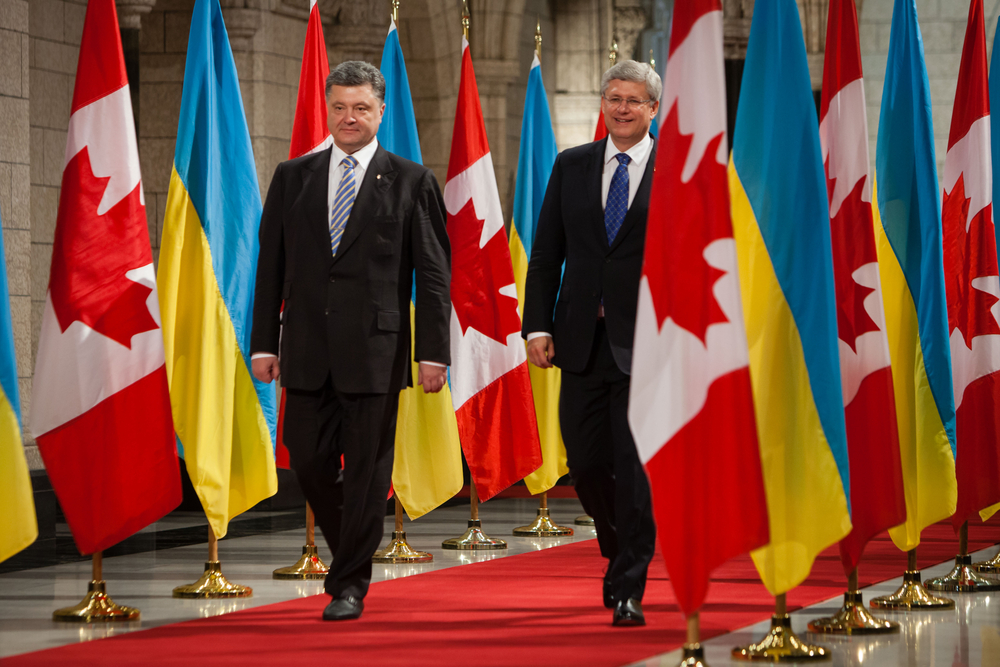
Ottawa, Ontario — Prime Minister Stephen Harper today announced that Canada and Ukraine have successfully concluded negotiations toward the Canada-Ukraine Free Trade Agreement (CUFTA). The bilateral free trade agreement will boost commercial ties between the two countries, creating jobs and opportunities for Canadians across Canada. The announcement was made just a few weeks after the Prime Minister’s visit to Ukraine in early June, his third to the country since March 2014.
The CUFTA will provide improved market access for Canadian exports to the Ukrainian market, help address non-tariff barriers and facilitate closer economic relations. In addition, the CUFTA will provide Ukrainian exports with improved access to the Canadian market, which is consistent with the Government’s unwavering commitment to support Ukraine’s democratic transition and economic reforms.
Once the Agreement enters into force, Canada and Ukraine will immediately eliminate duties on 99.9 per cent and 86 per cent of respective current imports, thereby benefiting both Canadian and Ukrainian exporters and consumers. The Agreement will result in the elimination of all Ukrainian tariffs on industrial goods, forestry and wood products, fish and seafood products, as well as the elimination of the vast majority of Ukraine’s agricultural tariffs. Canadian agriculture exporters will benefit from duty-free access for beef, pulses, grains, canola oil, processed foods and animal feed. Canadian pork producers will benefit from improved access to Ukraine’s market via a large tariff rate quota.
Prime Minister Harper highlighted the inclusion of Ukraine as a priority emerging market under Canada’s Global Markets Action Plan and as one of Canada’s development countries of focus. He also publicly released Canada’s market access plan for Ukraine – another tool the Government of Canada is providing to help Canadian companies, especially small and medium-sized enterprises, identify new opportunities to do business in Ukraine.
The Agreement is informed by public consultations, and reflects the views and priorities of Canadian businesses, industry associations, provinces and territories, and other stakeholders.
Quick Facts
— Since 2006, the Government of Canada has concluded free trade agreements with 39 countries, bringing the total to 44.
— Total bilateral merchandise trade between Canada and Ukraine averaged $347 million in 2011-2013, and is expected to expand by 19 per cent as a result of the implementation of this trade agreement.
— Canada’s gross domestic product (GDP) would increase by $29.2 million under this trade agreement; similarly, Ukraine’s GDP would expand by $18.6 million.
— Canada’s exports to Ukraine would increase by $41.2 million. Canada’s export gains would be broad-based with exports of pork, machinery and equipment, transport equipment, other manufactured products, motor vehicles and parts, as well as chemical products leading the way.
— With the conclusion of the Canada-European Union Comprehensive Economic and Trade Agreement and the coming into force of the Canada-Korea Free Trade Agreement on January 1, 2015, Canadian exporters will soon benefit from preferential access to more than half of the global marketplace.
Quote
“Our Government has shown an unwavering commitment to ensuring the stability and security of Ukraine. Today’s conclusion of the Canada-Ukraine Free Trade Agreement is another milestone in the important relationship between our two countries. We remain committed to creating the best conditions for Canadian companies to succeed abroad, as well as to ensure jobs and opportunities across our country.”
– Prime Minister Stephen Harper